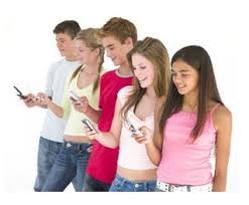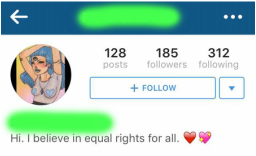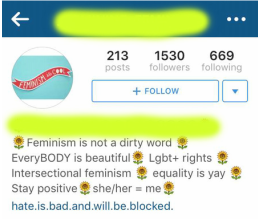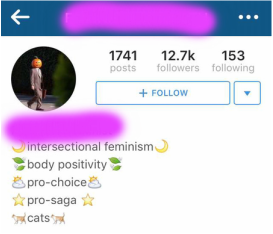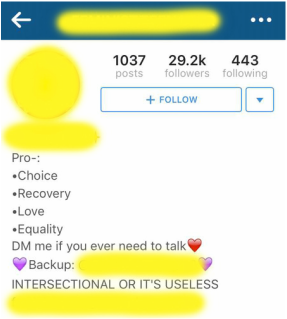"This feminism/political awareness starts to seem almost ironically dogmatic rather than critical. Instead of a movement furthered by individuals questioning themselves and the people around them—posting about their own experiences, discoveries, realizations, and thinking for themselves—they are swimming in their old bathwater, to use the expression." |
It is commemorable that my generation is so politically and socio-politically aware, which is in part due to a widespread use of social media. Here, people have access to many mediums and platforms of conversation. However, some of these socially aware people of the internet don´t seem to care so much about the issues they’re preaching, but rather the badge they get to wear from preaching.
It has become a trend to create Instagram profiles (or other social media profiles) dedicated to social issues, and we have seen how influential this can be- informative posts can spread like forest fires. A typical page’s biography might say things like “Call me out if I’m problematic!” or “feminist” or “pro-[insert an oppressed or marginalized group]” or “anti-[insert oppressive group or institution].” When looking through these pages, there is almost something uniform about them. The pages are often comprised of screenshots of Tumblr posts with regurgitated captions. There is nothing fundamentally wrong with that. That is spreading awareness. However, many of these pages (or, the people behind them) fail to develop their own ideas or language around the subject matter. This feminism/political awareness starts to seem almost ironically dogmatic rather than critical. Instead of a movement furthered by individuals questioning themselves and the people around them—posting about their own experiences, discoveries, realizations, and thinking for themselves—they are swimming in their old bathwater, to use the expression.
Below are some examples of what these Instagram profiles often look like. The usernames names are blurred out. I do not want to trivialize the issues these pages stand for, and I haven’t had problems with the particular profiles shown; I am simply choosing them because they exemplify the uniformity I mentioned earlier:
It has become a trend to create Instagram profiles (or other social media profiles) dedicated to social issues, and we have seen how influential this can be- informative posts can spread like forest fires. A typical page’s biography might say things like “Call me out if I’m problematic!” or “feminist” or “pro-[insert an oppressed or marginalized group]” or “anti-[insert oppressive group or institution].” When looking through these pages, there is almost something uniform about them. The pages are often comprised of screenshots of Tumblr posts with regurgitated captions. There is nothing fundamentally wrong with that. That is spreading awareness. However, many of these pages (or, the people behind them) fail to develop their own ideas or language around the subject matter. This feminism/political awareness starts to seem almost ironically dogmatic rather than critical. Instead of a movement furthered by individuals questioning themselves and the people around them—posting about their own experiences, discoveries, realizations, and thinking for themselves—they are swimming in their old bathwater, to use the expression.
Below are some examples of what these Instagram profiles often look like. The usernames names are blurred out. I do not want to trivialize the issues these pages stand for, and I haven’t had problems with the particular profiles shown; I am simply choosing them because they exemplify the uniformity I mentioned earlier:
The internet can be absolutely powerful. (See Roxane Gay’s Twitter, Kate Schatz’s Rad American Women, Chescaleigh on youtube, or Lindy West’s This American Life episode.) And even these Instagram profiles can be very powerful as well. Many people feel as though they have learned a lot about current issues and social issues via the Instagram platform. This is also not a criticism of all of these pages, political correctness, “social justice warriors” or of calling people out in general. Calling people out is extremely necessary, and should never be discouraged. But another issue has arisen that I do not hear as many people talk about--some of these politically aware communities do not value discourse; many people will tell someone that they’ve said something offensive, but few people will explain to them why.
This is where it gets tricky. It is not automatically someone's responsibility to educate someone else. That person can find other sources to educate themselves. But the attempted conversations often end where they started. People are still angry. People are still unaware.
Often a circumstance will play out like this: Somebody will say something that is deemed ignorant, offensive, or unaware. Hoards of people will @, or reply to this person, saying things like “um??” or “did you read what you just said?” or “seriously?” If they know the person, they might say ¨wow, I wouldn't have expected that from you¨ or ¨I thought better of you.¨ On occasion, this is probably a warranted response. However, often times the person was truly unaware that what they said could be deemed offensive- they may have even asked a question trying to learn more about a topic, and in return they are faced with, ironically, closed mindedness and uniform responses. People get shamed, whether or not they “deserve” it.
Part of the beauty of these social media pages is that they allow anonymity. They create a safe space for people to feel brave enough to speak out if they want to. They feel empowered to speak to people about sensitive and difficult issues in a way they would not be able to face to face. But this anonymity too often gets abused and has its flaws. In Psychology Today, Liraz Margalit Ph.D. writes “Studies have found that day-to-day interactions are based almost entirely on nonverbal communication. When we interact with others, we are continuously processing wordless signals like facial expressions, tone of voice, gestures, body language, eye contact, and even the physical distance between us and them. These nonverbal signals are the heart and soul of the interaction. We cannot understand the true meaning of an interaction if we do not have the ability to interpret these nonverbal signals (as in the case of autism). They enable us to infer the other person's intentions, as well as how involved they are in the conversation, whether they are stressed or relaxed, if they are attracted to us, and so on.” These types of conversations are very sensitive. Both sides require empathy, compassion, patience, and listening. This is very difficult to achieve through a comment section online. And herd mentality inevitably arises in the comments on these posts- on both sides of the equation.
A superiority complex can come from many aspects of running these pages. One, as mentioned, is the anonymity. These pages can almost act as alter egos. Someone’s internet presence likely differs greatly from their real life presence. On the internet or social media, one can take their time to type of a response, whereas in person they can’t rely on that time and careful wording as much. Now, people have the ability to manipulate their own rhetoric and responses as well as the ability to present oneself in a very specific way catered to followers, creating a false sense of superiority. These pages can also get very popular, gaining thousands of followers. This person now has a large army of people willing to defend them and praise them. And, ironically once again, while these people tackle topics of privilege they often fail to acknowledge the privilege they have in being able to speak to so many people, on such a large platform.
A lot of the time, the person being called out is left in the dark about what they did wrong. Somebody told me about a time they were left completely confused after they said something that they didn´t know was offensive. ¨I once got attacked by someone for saying bi polar. Everyone here says it so I didn't think anything of it but instead of messaging me and telling [me] why it wasn't ok, which I still don´t know, they attacked me for everyone to see [.] I don´t remember exactly what they said but it was something along the lines of, wow. I thought better of you. You shouldn´t say stuff like that. I can´t believe you would be so insensitive. And I was literally like, what just happened?¨ Often times the possibility of pure ignorance is overlooked and someone gets called out publicly without ever having anyone attempt to explain to them why something they said was problematic.
Many of the runners of these pages say ¨Call me out if Iḿ problematic!¨ but they when faced with what they did not believe could happen, they do not know how to respond. When called out or even slightly questioned they get extremely defensive. Maybe this is because they have not allowed other people the chance to appropriately respond, so they don´t know how to appropriately respond themselves (however, in their defense, this is the internet; it’s hard to know whether or not the person saying the offensive thing is coming from a good place or simply a malicious one). Maybe itś because these communities often have an attitude of rightness and superiority that comes with the ability to hide behind a screen. Maybe admitting that they hold privilege would shatter their self image.
A friend of mine came across a photo on instagram posted by one of these social justice pages that said something along the lines of “ ‘Never forget 9-11-’ and then a screencap from somebody in a movie saying ‘Shut the f*ck up!’ ” The caption explained that Muslims faced horrible discrimination because of 9/11. One instagrammer commented on this, saying that she agreed that the discrimination against Muslims is wrong, but the post is still insensitive to all the people who lost somebody in 9/11. This is how the profile responded:
This is where it gets tricky. It is not automatically someone's responsibility to educate someone else. That person can find other sources to educate themselves. But the attempted conversations often end where they started. People are still angry. People are still unaware.
Often a circumstance will play out like this: Somebody will say something that is deemed ignorant, offensive, or unaware. Hoards of people will @, or reply to this person, saying things like “um??” or “did you read what you just said?” or “seriously?” If they know the person, they might say ¨wow, I wouldn't have expected that from you¨ or ¨I thought better of you.¨ On occasion, this is probably a warranted response. However, often times the person was truly unaware that what they said could be deemed offensive- they may have even asked a question trying to learn more about a topic, and in return they are faced with, ironically, closed mindedness and uniform responses. People get shamed, whether or not they “deserve” it.
Part of the beauty of these social media pages is that they allow anonymity. They create a safe space for people to feel brave enough to speak out if they want to. They feel empowered to speak to people about sensitive and difficult issues in a way they would not be able to face to face. But this anonymity too often gets abused and has its flaws. In Psychology Today, Liraz Margalit Ph.D. writes “Studies have found that day-to-day interactions are based almost entirely on nonverbal communication. When we interact with others, we are continuously processing wordless signals like facial expressions, tone of voice, gestures, body language, eye contact, and even the physical distance between us and them. These nonverbal signals are the heart and soul of the interaction. We cannot understand the true meaning of an interaction if we do not have the ability to interpret these nonverbal signals (as in the case of autism). They enable us to infer the other person's intentions, as well as how involved they are in the conversation, whether they are stressed or relaxed, if they are attracted to us, and so on.” These types of conversations are very sensitive. Both sides require empathy, compassion, patience, and listening. This is very difficult to achieve through a comment section online. And herd mentality inevitably arises in the comments on these posts- on both sides of the equation.
A superiority complex can come from many aspects of running these pages. One, as mentioned, is the anonymity. These pages can almost act as alter egos. Someone’s internet presence likely differs greatly from their real life presence. On the internet or social media, one can take their time to type of a response, whereas in person they can’t rely on that time and careful wording as much. Now, people have the ability to manipulate their own rhetoric and responses as well as the ability to present oneself in a very specific way catered to followers, creating a false sense of superiority. These pages can also get very popular, gaining thousands of followers. This person now has a large army of people willing to defend them and praise them. And, ironically once again, while these people tackle topics of privilege they often fail to acknowledge the privilege they have in being able to speak to so many people, on such a large platform.
A lot of the time, the person being called out is left in the dark about what they did wrong. Somebody told me about a time they were left completely confused after they said something that they didn´t know was offensive. ¨I once got attacked by someone for saying bi polar. Everyone here says it so I didn't think anything of it but instead of messaging me and telling [me] why it wasn't ok, which I still don´t know, they attacked me for everyone to see [.] I don´t remember exactly what they said but it was something along the lines of, wow. I thought better of you. You shouldn´t say stuff like that. I can´t believe you would be so insensitive. And I was literally like, what just happened?¨ Often times the possibility of pure ignorance is overlooked and someone gets called out publicly without ever having anyone attempt to explain to them why something they said was problematic.
Many of the runners of these pages say ¨Call me out if Iḿ problematic!¨ but they when faced with what they did not believe could happen, they do not know how to respond. When called out or even slightly questioned they get extremely defensive. Maybe this is because they have not allowed other people the chance to appropriately respond, so they don´t know how to appropriately respond themselves (however, in their defense, this is the internet; it’s hard to know whether or not the person saying the offensive thing is coming from a good place or simply a malicious one). Maybe itś because these communities often have an attitude of rightness and superiority that comes with the ability to hide behind a screen. Maybe admitting that they hold privilege would shatter their self image.
A friend of mine came across a photo on instagram posted by one of these social justice pages that said something along the lines of “ ‘Never forget 9-11-’ and then a screencap from somebody in a movie saying ‘Shut the f*ck up!’ ” The caption explained that Muslims faced horrible discrimination because of 9/11. One instagrammer commented on this, saying that she agreed that the discrimination against Muslims is wrong, but the post is still insensitive to all the people who lost somebody in 9/11. This is how the profile responded:
A phone, and all that it gives us access to, is a powerful tool; a privilege. However, some people abuse it. It allows anonymity. It cultivates entitlement, superiority, and is often not a great place to have understanding and empathetic conversations. It’s easy to fall into this pattern. I’ve done it myself.
While I am nobody to judge whether the people behind these profiles really care about the issues they’re talking about and whether or not they are acting self-indulgently, it is hard to feel like these pages are being created for the sake of unity over these problems. You can call yourself a feminist or socially aware, but how are you helping people with that badge if you’re rarely interested in actually talking about it, especially with people who don't agree with you? If you do not want to explain yourself or have a conversation with your followers, why are you creating this profile in the first place? How are you, the creator of the page, benefitting when you are simply regurgitating what you have been taught about feminism/social justice and not formulating ideas of your own?
While I am nobody to judge whether the people behind these profiles really care about the issues they’re talking about and whether or not they are acting self-indulgently, it is hard to feel like these pages are being created for the sake of unity over these problems. You can call yourself a feminist or socially aware, but how are you helping people with that badge if you’re rarely interested in actually talking about it, especially with people who don't agree with you? If you do not want to explain yourself or have a conversation with your followers, why are you creating this profile in the first place? How are you, the creator of the page, benefitting when you are simply regurgitating what you have been taught about feminism/social justice and not formulating ideas of your own?
